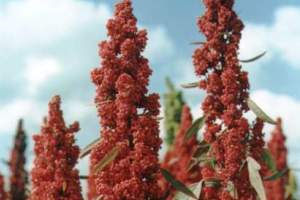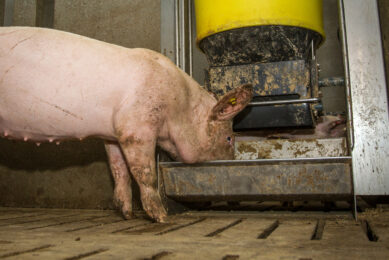RESEARCH: Effects of quinoa hull saponins on pigs and piglets

Danish researchers have published an article in the Journal of Animal Physiology and Animal Nutrition on the effect of saponins found in quinoa hulls on piglet performance. Saponin-containing feed additives have been shown to have a positive effect on pig performance, but addition of saponin-rich quinoa hull to piglet diets has shown no effect.
Quinoa hull has high saponin content and may be of interest as a feed additive. This study aimed to evaluate quinoa hull meal as a feed additive in a pig diet.
Methods
The effects of quinoa hull meal were assessed for three dosages of South American origin (100, 300 and 500 mg/kg) and one dosage of Danish quinoa (300 mg/kg). In addition, the effect of dietary South American quinoa hull meal and South American quinoa hull meal extract on jejunal epithelial physiology was studied ex vivo in Ussing chambers.
The experiment included 400 piglets weaned at 28±2 days of age and the experimental period was four weeks. Piglets were weighed initially and finally and feed intake registered.
The ex vivo studies were performed with epithelium from 40 pigs receiving control or South American quinoa hull meal. Epithelium from each pig was placed into eight Ussing chambers, where four concentrations of South American quinoa hull meal extract were added. Epithelial permeability, Na+-dependent glucose transport and serotonin (5-HT) and theophylline-induced secretion were measured.
Conclusions
The results showed that quinoa hull meal had no influence on piglet’s growth or feed intake. In spite of a large difference in saponin content between South American quinoa hull meal and Danish quinoa hull meal (28.7% and 2.0% w/w respectively) the source did not affect pig performance.
The ex vivo studies revealed no effect of adding quinoa hull meal extract into the medium. The permeability and glucose induced absorption were highest in epithelium from pigs that consumed 100 or 300 mg/kg South American quinoa hull meal.
The secretory response to 5-HT was not affected by dietary treatments, but the theophylline-induced secretion decreased with increasing dietary South American quinoa hull meal.
The changes in epithelial physiology measured ex vivo did not affect animal performance in vivo in this study.
The study can be found behind a paywall here.











